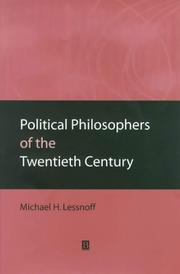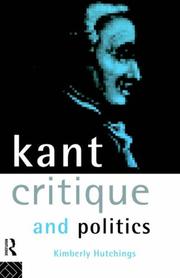| Listing 1 - 10 of 14 | << page >> |
Sort by
|
Book
ISBN: 9780823270538 082327053X Year: 2016 Publisher: New York Fordham university press
Abstract | Keywords | Export | Availability | Bookmark
 Loading...
Loading...Choose an application
- Reference Manager
- EndNote
- RefWorks (Direct export to RefWorks)
What if political rhetoric is unavoidable, an irreducible part of politics itself? In contrast to the familiar denunciations of political horse-trading, grandstanding, and corporate manipulation from those lamenting the crisis in liberal democracy, this book argues that the "politics of politics," usually associated with rhetoric and sophistry, is, like it or not, part of politics from the start. Denunciations of the sorry state of current politics draw on a dogmatism and moralism that share an essentially metaphysical and Platonic ground. Failure to deconstruct that ground generates a philosophically and politically debilitating selfrighteousness that this book attempts to understand and undermine. After a detailed analysis of Foucault's influential late concept of parrhesia, which is shown to be both philosophically and politically insufficient, close readings of Heidegger, Kierkegaard, and Derrida trace complex relations between sophistry, rhetoric, and philosophy; truth and untruth; decision; madness and stupidity in an exploration of the possibility of developing an affirmative thinking of politics that is not mortgaged to the metaphysics of presence. It is suggested that Heidegger's complex accounts of truth and decision must indeed be read in close conjunction with his notorious Nazi commitments but nevertheless contain essential insights that many strident responses to those commitments ignore or repress. Those insights are here developed--via an ambitious account of Derrida's often misunderstood interruption of teleology--into a deconstructive retrieval of the concept of dignity. This lucid and often witty account of a crucial set of developments in twentieth-century thought prepares the way for a more general re-reading of the possibilities of political philosophy that will be undertaken in Volume 2 of this work, under the sign of an essential scatter that defines the political as such.
Political science --- Political and social views --- History --- Philosophy --- Heidegger, Martin, --- Foucault, Michel, --- Derrida, Jacques, --- Political science - Philosophy --- Political science - Philosophy - History - 20th century --- Heidegger, Martin, - 1889-1976 --- Foucault, Michel, - 1926-1984 --- Derrida, Jacques, - 1930-2004
Book
ISBN: 9782070179725 9782070179718 9782070179701 2070179702 2070179729 Year: 2018 Publisher: Paris: Gallimard,
Abstract | Keywords | Export | Availability | Bookmark
 Loading...
Loading...Choose an application
- Reference Manager
- EndNote
- RefWorks (Direct export to RefWorks)
Ce volume comprend les cinq premiers des trente-quatre Cahiers rédigés par Heidegger depuis le début des années 1930 jusqu'à la fin de sa vie (la série commence en fait au deuxième de ces Cahiers, le premier ayant été perdu). Les "Cahiers noirs" ou "Cahiers de travail" (ainsi Heidegger les dénommait-il lui-même d'après leur fonction ou la couleur de leur reliure) occupent une place singulière dans l'ensemble de ce qu'a écrit l'auteur. Son souhait de les voir publiés après que fut achevée l'édition intégrale de ses oeuvres signifie qu'il a voulu laisser aux lecteurs soucieux de comprendre sa pensée un moyen d'en appréhender le travail au plus près de son élaboration. La publication de ces Cahiers permet-elle de mieux connaître Heidegger ? Certainement pas, si l'on entend par "connaître" le fait d'entrer dans l'intimité d'une personne. On ne trouvera pas trace d'une quelconque confidence dans ces pages. En revanche, on y verra à l'oeuvre l'effort sans relâche d'un philosophe pour reprendre et préciser sa pensée. Les Cahiers commencent au moment où Heidegger entreprend d'approfondir la position conquise avec Être et Temps (1927). Ils permettent de suivre l'aventure intellectuelle qu'allait représenter pour lui la découverte déconcertante de ce qu'il finirait par appeler "l'histoire de l'être".
Philosophy, German --- Philosophie allemande --- Political science --- Science politique --- Philosophy --- History --- Philosophie --- Histoire --- Philosophie politique --- Phenomenology --- War (Philosophy) --- National socialism and philosophy. --- Political science - Philosophy - History - 20th century --- Notebooks, sketchbooks, etc

ISBN: 3787314563 9783787314560 Year: 1999 Volume: 5 Publisher: Hamburg Meiner
Abstract | Keywords | Export | Availability | Bookmark
 Loading...
Loading...Choose an application
- Reference Manager
- EndNote
- RefWorks (Direct export to RefWorks)
Political philosophy. Social philosophy --- Cassirer, Ernst --- Political science --- Philosophy --- History --- Cassirer, Ernst, --- -Administration --- Civil government --- Commonwealth, The --- Government --- Political theory --- Political thought --- Politics --- Science, Political --- Social sciences --- State, The --- -History --- -Cassirer, Ernst --- -Philosophy --- Political science - Philosophy - History - 20th century --- Cassirer, Ernst, - 1874-1945

ISBN: 2200014414 9782200014414 Year: 1996 Publisher: Colin
Abstract | Keywords | Export | Availability | Bookmark
 Loading...
Loading...Choose an application
- Reference Manager
- EndNote
- RefWorks (Direct export to RefWorks)
Ideology --- Political science --- Idéologie --- Science politique --- --Philosophie --- --XXe s., --- History --- Philosophy --- Idéologie --- Ideology - History - 20th century --- Political science - Philosophy - History - 20th century --- Philosophie --- XXe s., 1901-2000 --- Idéologie et historiographie --- Mythes politiques --- Idéologie et langage --- Racisme --- Totalitarisme --- Idées politiques --- 20e siècle --- Terminologie

ISBN: 0631202609 0631202617 9780631202608 9780631202615 Year: 1999 Publisher: Oxford Blackwell
Abstract | Keywords | Export | Availability | Bookmark
 Loading...
Loading...Choose an application
- Reference Manager
- EndNote
- RefWorks (Direct export to RefWorks)
Political science --- Philosophy --- History --- -Political science --- -Administration --- Civil government --- Commonwealth, The --- Government --- Political theory --- Political thought --- Politics --- Science, Political --- Social sciences --- State, The --- -Philosophy --- -History --- -Political and social philosophers --- Political and social philosophers --- anno 1900-1999 --- 20th century --- Political science - Philosophy - History - 20th century --- Political science - History - 20th century
Book
ISBN: 2905614358 9782905614353 Year: 1990 Publisher: Grenoble Millon
Abstract | Keywords | Export | Availability | Bookmark
 Loading...
Loading...Choose an application
- Reference Manager
- EndNote
- RefWorks (Direct export to RefWorks)
Heidegger, Martin --- Political science --- Science politique --- Philosophy --- History --- Philosophie --- Histoire --- Heidegger, Martin, --- Nazisme --- Phénoménologie --- Philosophie politique --- Khaĭdegger, Martin, --- Haĭdegger, Martin, --- Hīdajar, Mārtin, --- Hai-te-ko, --- Haidegŏ, --- Chaitenger, Martinos, --- Chaitenker, Martinos, --- Chaintenger, Martin, --- Khaĭdeger, Martin, --- Hai-te-ko-erh, --- Haideger, Marṭinn, --- Heidegger, M. --- Haideger, Martin, --- Hajdeger, Martin, --- הייגדר, מרתין --- היידגר, מרטין --- היידגר, מרטין, --- 海德格尔, --- Chaintenker, Martin, --- Hāydigir, Mārtīn, --- Hīdigir, Mārtīn, --- هاىدگر, مارتين, --- هىدگر, مارتين, --- Political science - Philosophy - History - 20th century.

ISBN: 0674387112 9780674387119 Year: 1993 Publisher: Cambridge (MA) ; London : Harvard University Press,
Abstract | Keywords | Export | Availability | Bookmark
 Loading...
Loading...Choose an application
- Reference Manager
- EndNote
- RefWorks (Direct export to RefWorks)
Nationaal-socialisme --- National socialism --- National-socialisme --- Nazism --- Nazisme --- Philosophy, German --- Political science --- National socialism. --- Philosophie allemande --- Science politique --- Philosophy --- History --- Philosophie --- Histoire --- Heidegger, Martin, --- -Political science --- -Administration --- Civil government --- Commonwealth, The --- Government --- Political theory --- Political thought --- Politics --- Science, Political --- Social sciences --- State, The --- German philosophy --- Authoritarianism --- Fascism --- Nazis --- Neo-Nazism --- Totalitarianism --- World War, 1939-1945 --- -History --- -Causes --- Heidegger, Martin --- -Philosophy --- -Heidegger, Martin --- -Nazism --- Administration --- Philosophy [German ] --- Heidegger, Martin, 1889-1976. --- Philosophy, German - 20th century. --- Political science - Philosophy - History - 20th century.
Book
ISBN: 9782914958905 2914958900 Year: 2010 Publisher: Paris : Ed. du Sandre,
Abstract | Keywords | Export | Availability | Bookmark
 Loading...
Loading...Choose an application
- Reference Manager
- EndNote
- RefWorks (Direct export to RefWorks)
Castoriadis, Cornelius, --- Autonomy --- Political science --- Philosophy --- History --- Political Philosophy - 20th Century - Critical Studies --- Administration --- Civil government --- Commonwealth, The --- Government --- Political theory --- Political thought --- Politics --- Science, Political --- Social sciences --- State, The --- Castoriadis, Cornelius --- Castoriadis, Cornelius, - 1922-1997 --- Autonomy - Congresses --- Political science - Philosophy - History - 20th century - Congresses --- Castoriadis, Cornelius, - 1922-1997 - Congresses --- Political Philosophy - 20th Century - Critical Studies. --- Castoriadis, Cornelius (1922-1997) --- Autonomie (philosophie) --- Critique et interprétation
Multi
ISBN: 9782870601907 2870601905 Year: 2020 Publisher: Bruxelles OUSIA
Abstract | Keywords | Export | Availability | Bookmark
 Loading...
Loading...Choose an application
- Reference Manager
- EndNote
- RefWorks (Direct export to RefWorks)
Pendant des siècles, les Européens se sont représenté leur vie commune à travers une image simple, l’image du corps politique. Cette image signifiait que l’homme ne s’accomplit véritablement que par son inscription dans une Cité qui le dépasse. Sans cesse reprise et réinventée, la métaphore du corps politique a constitué un lieu commun de la pensée européenne jusqu’au XXe siècle. Elle devient alors suspecte, dans la mesure où elle semble réduire l’individu à n’être qu’un organe au service de la collectivité. On aurait pu croire la métaphore du corps politique périmée. Elle se retrouve pourtant sous la plume de penseurs contemporains, ayant en commun de s’inscrire dans la tradition phénoménologique. Arendt, Merleau-Ponty, Lefort et Ricœur réaffirment la nécessaire appartenance de l’homme à un corps politique, ou encore l’existence d’une chair du politique. Comment comprendre la présence, chez ces auteurs, de l’image ancienne du corps politique ? Que nous apprend cette image de la phénoménologie et de notre condition politique ?
Political philosophy. Social philosophy --- Arendt, Hannah --- Ricœur, Paul --- Lefort, Claude --- Merleau-Ponty, Maurice --- Corps humain --- Phénoménologie. --- Totalitarisme. --- Aspect politique. --- Ricoeur, Paul --- Critique et interprétation. --- Arendt, Hannah, --- Merleau-Ponty, Maurice, --- Criticism and interpretation. --- Political science --- Philosophy --- History --- Lefort, Claude, --- Phenomenology --- Human body --- Phenomenology. --- Totalitarianism --- Philosophy. --- Political aspects. --- Political science - Philosophy - History - 20th century --- Arendt, Hannah, - 1906-1975 --- Lefort, Claude, - 1924-2010 --- Merleau-Ponty, Maurice, - 1908-1961

ISBN: 0415105080 9780415105088 Year: 1996 Publisher: London Routledge
Abstract | Keywords | Export | Availability | Bookmark
 Loading...
Loading...Choose an application
- Reference Manager
- EndNote
- RefWorks (Direct export to RefWorks)
Philosophy, Modern --- Political science --- Philosophy --- History --- Kant, Immanuel, --- Kant, Emmanuel --- Kant, Emanuel --- Kant, Emanuele --- Influence. --- Kant, Immanuel --- Kant, I. --- Kānt, ʻAmmānūʼīl, --- Kant, Immanouel, --- Kant, Immanuil, --- Kʻantʻŭ, --- Kant, --- Kant, Emmanuel, --- Ḳanṭ, ʻImanuʼel, --- Kant, E., --- Kant, Emanuel, --- Cantơ, I., --- Kant, Emanuele, --- Kant, Im. --- קאנט --- קאנט, א. --- קאנט, עמנואל --- קאנט, עמנואל, --- קאנט, ע. --- קנט --- קנט, עמנואל --- קנט, עמנואל, --- كانت ، ايمانوئل --- كنت، إمانويل، --- カントイマニユエル, --- Kangde, --- 康德, --- Kanṭ, Īmānwīl, --- كانط، إيمانويل --- Kant, Manuel, --- Philosophy, Modern - 20th century --- Political science - Philosophy - History - 20th century --- Kant, Immanuel, - 1724-1804
| Listing 1 - 10 of 14 | << page >> |
Sort by
|

 Search
Search Feedback
Feedback About UniCat
About UniCat  Help
Help News
News